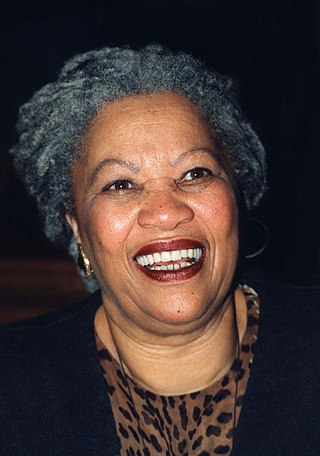
Chloe Anthony Wofford Morrison, known as Toni Morrison, was an American novelist and editor. Her first novel, The Bluest Eye, was published in 1970. The critically acclaimed Song of Solomon (1977) brought her national attention and won the National Book Critics Circle Award. In 1988, Morrison won the Pulitzer Prize for Beloved (1987); she was awarded the Nobel Prize in Literature in 1993.
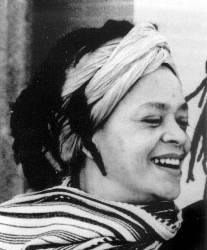
Toni Cade Bambara, born Miltona Mirkin Cade, was an African-American author, documentary film-maker, social activist and college professor.

Swakopmund is a city on the coast of western Namibia, 352 km (219 mi) west of the Namibian capital Windhoek via the B2 main road. It is the capital of the Erongo administrative district. As of 2011, the town had 44,725 inhabitants and 196 km2 (76 sq mi) of land. In 2023, the population had increased to 75,921 people.
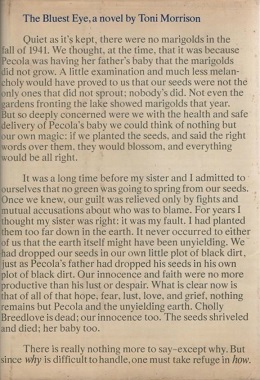
The Bluest Eye, published in 1970, is the first novel written by Toni Morrison. The novel takes place in Lorain, Ohio, and tells the story of a young African-American girl named Pecola who grew up following the Great Depression. Set in 1941, the story is about how she is consistently regarded as "ugly" due to her mannerisms and dark skin. As a result, she develops an inferiority complex, which fuels her desire for the blue eyes she equates with "whiteness".
Nellie Yvonne McKay was an American academic and author who was the Evjue-Bascom Professor of American and African-American Literature at the University of Wisconsin–Madison, where she also taught in English and women's studies, and is best known as the co-editor of the Norton Anthology of African-American Literature.
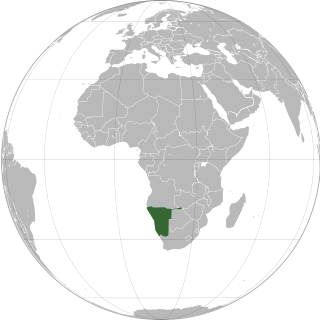
Lesbian, gay, bisexual, and transgender (LGBT) people in Namibia have expanded in recent years, although LGBT people still have limited legal protections. Sexual contact between men is criminalised within Namibia, although this law is generally unenforced.
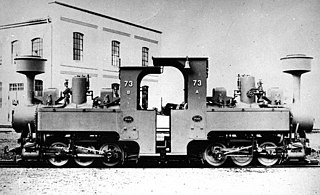
The South West African Zwillinge 0-6-0T of 1898 was a narrow gauge steam locomotive from the German South West Africa era.

The rail service in Namibia is provided by TransNamib. The Namibian rail network consists of 2,687 km of tracks (2017).

The history of rail transport in Namibia began with a small mining rail line at Cape Cross in 1895. The first major railway project was started in 1897 when the German Colonial Authority built the 600 mm gauge Staatsbahn from Swakopmund to Windhoek. By 1902 the line was completed.
Dr. Janis Alene Mayes is an American author, literary critic and translator and a professor in Africana literature.

Namibia is a multilingual country in which German is recognised as a national language. While English has been the sole official language of the country since 1990, in many areas of the country, German enjoys official status at a community level. A national variety of German is also known as Namdeutsch.
The Swakopmund–Windhoek line was a main 600 mm narrow-gauge railway line in Namibia. It was built in 1897 and operated until 1990 when the route name was changed.
Sylvia Schlettwein is a Namibian writer, teacher, translator and literary critic. She was the Head of the Department for Languages and Communication at the International University of Management in the capital Windhoek.
Sister Namibia, formerly known as the Sister Namibia Collective, is a feminist nonpartisan non-governmental organization (NGO) located in Windhoek, Namibia. The organization was established in 1989 on the eve of Namibia's independence from South Africa. Sister Namibia advocates for women's rights and engages in activities that promote full gender equality in a world free from violence, discrimination, and oppression. From its inception, the organization's main function has been to produce Sister Namibia Magazine. In the 1990s Sister Namibia expanded its operations to include educational programs, research, activism, media engagement, and cultural activities in support of women's rights.
Rosina ǁHoabes is a Namibian politician.
Germina Ndapua Shitaleni was a Namibian SWAPO politician. She was mayor of Swakopmund from 2008 to 2010, and a member of the National Council representing the Erongo Region from 2010 until her death.
Beatrice Sandelowsky is a Namibian archaeologist. She was a co-founder of The University Centre for Studies in Namibia (TUCSIN).

Miss Grand Namibia was a Namibian female beauty pageant founded in 2015 by Magnolia Kuhanga, the chairperson of the Windhoek-based organizer, Magnolia Events Management. The pageant was declared defunct in late 2018 after the incorporation between the aforementioned national organizer and Miss Grand International Limited was not extended and no other domestic organizer was interested in the license. Originally, the winners of the contest, which was held three times—in 2015, 2016, and 2018—were expected to represent Namibia on its international parent platform, Miss Grand International. However, all three winners withdrew from the international pageant for unspecified reasons; only one of them was replaced by an appointed representative.









